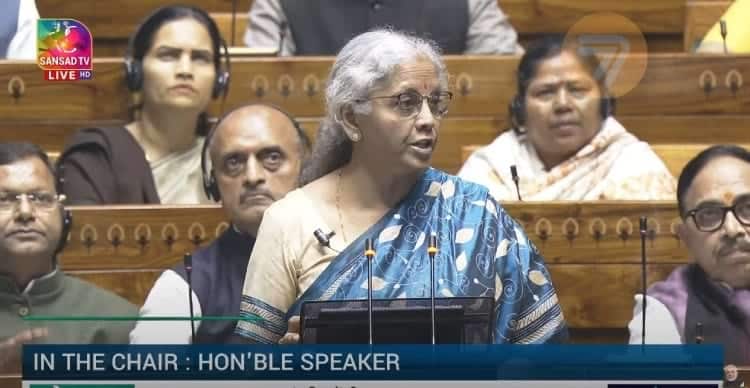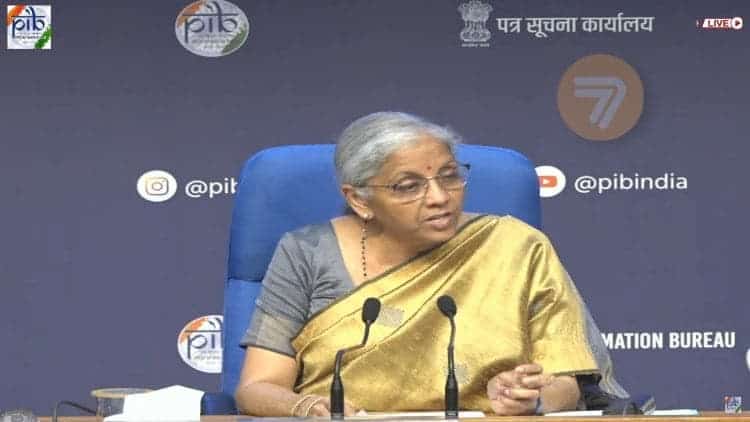GST Collection Confirms Center’s Stand on Online Games
04 Feb 2024
FM Nirmala Sitharaman presents Interim Budget 2024. Image Credits: Narendra Modi’s official YouTube channel.
Revenue Secretary Sanjay Malhotra Reports Sixfold Hike to ₹1,200 Cr
“The (revenues) are averaging about ₹1,200 crore now, as against ₹200 crore per month that we were getting earlier,” Revenue Secretary Sanjay Malhotra from the Union Ministry of Finance told interviewers, speaking about the effect of the latest amendments to GST legislation pertaining to gaming.
“(This is) only from online gaming platforms — this does not include casinos, etc. So there was a huge potential, which was untapped, and which we have been now able to tap,” Revenue Secretary Malhotra expressed the government’s satisfaction with the sixfold increase in tax collection results achieved.
Malhorta spoke to the media following the presentation of India’s Interim Budget 2024 by the Minister of Finance, Nirmala Sitharaman, on Thursday, the 1st of February, in Parliament. As 2024 is an election year, the government cannot present a full Annual Budget.
The Retrospective Dispute is in the Court, Amendments are Prospective
“That dispute is in the court, but going forward, there is no issue — all of them are paying 28%. And they are paying 28% on the actual value.” Revenue Secretary Malhotra told the reporters when asked about the retrospective tax evasion allegations demanding ₹1,12,332 crore from the industry.
The recent adjustments to GST Acts are prospective, Malhorta said. Even so, the government believed online games with stakes were liable for a 28% tax rate. As these activities fell into the category of actionable claims.
The Central and Integrated GST Acts
After three years in the making, the Central and Integrated GST Acts (CGST and IGST) were amended. This was following recommendations by the 50th and 51st Meetings of the GST Council. So that all forms of gaming with real money would attract the highest 28% GST rate slab. From the 1st of October 2023.
Due to the short time frame, states proceeded to amend their respective State GST Acts. Around a dozen of them did so via an Ordinance. Ordinances were later replaced. They were replaced by Acts of the respective Legislative Assemblies. As in the cases of Maharashtra, West Bengal, and Kerala.
Thus, the indirect tax levy on a game of chess with money was equalized to the regime over a game of roulette or blackjack in an online or land-based casino. With the tax in both cases applying to the initial money deposit or the initial purchase of chips. As per the so-called Entry-Level Rule. adopted at the 51st GST Council Meeting.
In the meantime, a Supreme Court division bench led by the Chief Justice of India (CJI) Dhananjaya Y. Chandrachud accepted to hear in detail the batch of pleas. These pleas were submitted by several online gaming businesses and the E-Gaming Federation of India (EGF). They are challenging the constitutional validity of the tax demands. The pleas also contest the categorization of online gaming prize pools as taxable actionable claims.
Interim Budget 2024: No Further Changes to Tax Regimes Proposed
“A governance with care, conviction, and confidence,” “GST; one nation, one market, one tax,” and bringing down the budget deficit to 4.5% or below by FY26 were among the highlights in Nirmala Sitharaman’s Budget FY 2024-25 speech, which did not propose any changes to the existing direct and indirect tax regime.
“As for tax proposals, in keeping with the convention, I do not propose to make any changes relating to taxation and propose to maintain the same tax rates for direct and indirect taxes, including import duties,” the FM stated but proposed to extend certain tax exemptions for startups and IFSC units until the 31st of March, 2025.
“By unifying the highly fragmented indirect tax regime in India, GST has reduced the compliance burden on trade and industry,” Minister of Finance Sitharaman pointed out in her speech.
“The industry has acknowledged the benefits of GST. According to a recent survey conducted by a leading consulting firm, 94 per cent of industry leaders view the transition to GST as largely positive,” she pointed out.
During the press conference following the sixth consecutive and shortest budget speech in her career (56 minutes), the Minister of Finance stressed that India is the fastest-growing economy in the G20, having registered 7% growth in all three preceding years.
In his remarks after the speech of the Finance Minister, India’s Prime Minister Narendra Modi praised the proposed budget as “inclusive and innovative.”
“It is the budget which will transform the future of India, and it strengthens the foundation for a ‘Developed India by 2047’,” the PM said and stressed measures such as the ₹1 lakh crore corpus fund for research and innovation and massive investments in the quality of the railways system.



